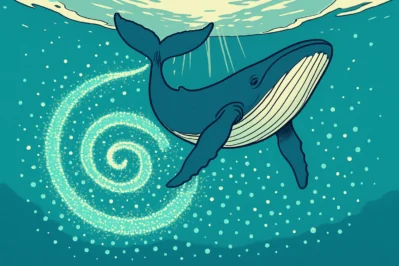Korean for Eco-Warriors: Discussing the Whale Pump
Hello! It’s your favorite Korean language booster, 매일한글 (Maeil Hangeul), here to upgrade your fluency!
Today, we’re diving deep—literally! We’ll explore how to discuss a fascinating and critical environmental topic in Korean: the “whale pump” and the role of whales in carbon capture. These aren’t just everyday phrases; they are your ticket to engaging in high-level discussions about science, policy, and the environment.
Recently in Korea, there’s been a surge of interest in ‘blue carbon’ and marine ecosystems, especially after a famous documentary on the subject was re-released with narration by a popular K-pop idol. This has sparked many sophisticated online discussions, and with today’s lesson, you’ll be ready to join in!
Core Expressions
Here are some key phrases to help you discuss biodiversity and climate solutions like a native speaker.
1. 탄소 포집 (Tanso Pojip)
* Pronunciation: [Tan-so Po-jip]
* English Meaning: Carbon Capture / Carbon Sequestration
* Detailed Explanation: This is a technical term essential for any climate change discussion. 탄소 (tanso) means ‘carbon’, and 포집 (pojip) means ‘to capture’ or ‘collect’. It refers to the process of capturing CO2 to prevent it from entering the atmosphere. It’s a formal, scientific term you’d see in news articles, academic papers, and documentaries.
* Example: 고래는 자연적인 탄소 포집에 중요한 역할을 합니다. (Gorae-neun jayeon-jeogin tanso pojip-e jungyohan yeokhal-eul hamnida.) – Whales play an important role in natural carbon capture.
2. 생태계의 선순환 (Saengtaegye-ui Seonsunhwan)
* Pronunciation: [Saeng-tae-gye-ui Seon-sun-hwan]
* English Meaning: The virtuous cycle of the ecosystem
* Detailed Explanation: This is a fantastic phrase to describe positive feedback loops in nature. 생태계 (saengtaegye) is ‘ecosystem’, and 선순환 (seonsunhwan) means ‘virtuous cycle’ (the opposite of 악순환 (aksunhwan), a vicious cycle). It describes a chain of events where positive results reinforce the initial action. This term elevates your argument from simply stating a fact to explaining a systemic benefit.
* Example: 고래 펌프는 해양 생태계의 선순환을 만들어냅니다. (Gorae peompeu-neun haeyang saengtaegye-ui seonsunhwan-eul mandeureonaemnida.) – The whale pump creates a virtuous cycle in the marine ecosystem.
3. 지대한 영향을 미치다 (Jidaehan Yeonghyang-eul Michida)
* Pronunciation: [Ji-dae-han Yeong-hyang-eul Mi-chi-da]
* English Meaning: To have a profound/significant impact on…
* Detailed Explanation: While you may know 영향을 주다 (yeonghyang-eul juda) (to give influence), this phrase is its more powerful, formal cousin. The adjective 지대하다 (jidaehada) means ‘immense’ or ‘profound’. Using this expression in a presentation or essay will make your language sound much more sophisticated and impactful.
* Example: 고래의 개체 수 감소는 기후 변화에 지대한 영향을 미칠 수 있습니다. (Gorae-ui gaeche su gamso-neun gihu byeonhwa-e jidaehan yeonghyang-eul michil su itseumnida.) – The decline in the whale population could have a profound impact on climate change.
4. ~는 데에 핵심적인 역할을 하다 (-neun de-e haeksimjeogin yeokhal-eul hada)
* Pronunciation: [-neun de-e haek-sim-jeo-gin yeok-hal-eul ha-da]
* English Meaning: To play a key/central role in (doing something)
* Detailed Explanation: This grammatical structure is perfect for precisely explaining the function of a subject within a complex process. It attaches to a verb stem + ~는 데에 (in the act of/process of ~ing) and is followed by 핵심적인 역할을 하다 (haeksimjeogin yeokhal-eul hada), which means ‘to play a key/core role’.
* Example: 식물성 플랑크톤은 대기 중의 탄소를 흡수하는 데에 핵심적인 역할을 합니다. (Singmul-seong peurangkeuton-eun daegi jung-ui tanso-reul heupsuha-neun de-e haeksimjeogin yeokhal-eul hamnida.) – Phytoplankton play a key role in absorbing atmospheric carbon.
Example Dialogue
Let’s see how these expressions work in a real conversation.
A: 수진 씨, 최근에 화제가 된 해양 다큐멘터리 봤어요? 고래 펌프에 대한 내용이 정말 흥미롭더라고요.
(Sujin, did you see that marine documentary that’s been trending recently? The part about the whale pump was fascinating.)
B: 아, 저도 봤어요! 고래가 해양 생태계의 선순환을 유지하는 데에 핵심적인 역할을 한다는 사실에 정말 놀랐어요.
(Ah, I saw it too! I was so surprised by the fact that whales play a key role in maintaining the virtuous cycle of the marine ecosystem.)
A: 맞아요. 고래의 배설물이 식물성 플랑크톤을 증식시키고, 그 플랑크톤이 다시 엄청난 양의 탄소 포집을 하잖아요.
(Exactly. The whale’s excrement helps phytoplankton proliferate, and that plankton then performs a huge amount of carbon capture.)
B: 네, 결국 고래를 보호하는 것이 기후 위기 대응에 지대한 영향을 미친다는 거겠죠. 정말 중요한 문제예요.
(Yes, which means that protecting whales ultimately has a profound impact on tackling the climate crisis. It’s such an important issue.)
Culture Tip & Trend Deep Dive
In Korea, environmentalism is rapidly moving into the mainstream, particularly among younger generations. The concept of ‘블루카본 (beullu-kabon – Blue Carbon)’—carbon captured by marine ecosystems—is a hot topic.
When you use advanced, specific terms like 탄소 포집 or 생태계의 선순환, you’re not just showing off your vocabulary. You’re demonstrating an ability to engage with the social and scientific issues that are important in modern Korean society. Try using these terms when discussing a company’s new ESG (Environmental, Social, and Governance) policy or an eco-friendly product. This will show you have a nuanced understanding that goes far beyond textbook Korean.
Wrap-up & Practice!
Today, we learned four powerful expressions to discuss the critical role of ecosystems in climate control. You can now talk about 탄소 포집 (carbon capture), describe a 생태계의 선순환 (virtuous cycle), emphasize a 지대한 영향 (profound impact), and explain a 핵심적인 역할 (key role).
Now, it’s your turn to practice!
Quiz: Fill in the blanks using the expressions we learned today.
고래는 해양 생태계의 영양분을 순환시켜 (______________) 유지하(____________________).
(Whales circulate nutrients in the marine ecosystem, ______________ in maintaining ______________.)
Hint: One blank is a noun phrase, the other is a verb phrase!
Leave your answer and try making your own sentence in the comments below! We’d love to see how you use these new tools. Keep up the great work






